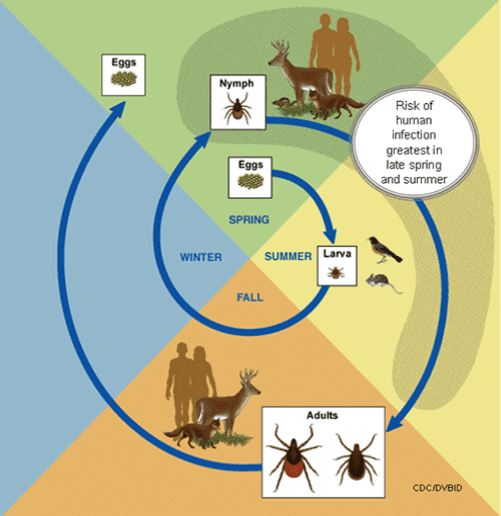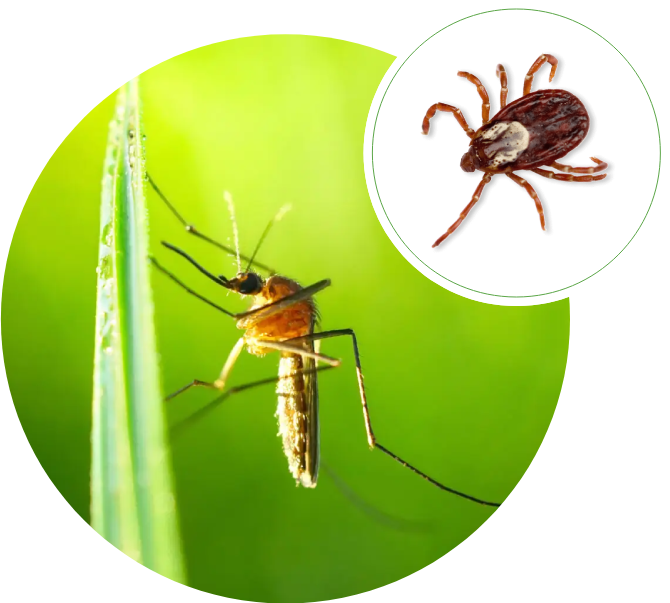Mosquitos
Types of Mosquitoes in New Hampshire and Their Dangers
New Hampshire is home to several species of mosquitoes, each with its own behaviors and potential health risks. Understanding these mosquitoes is crucial for effective prevention and control. Here’s a look at some common types found in the state and the dangers they pose.
1. Eastern Equine Encephalitis (EEE) Mosquitoes
- Species: Culiseta melanura
- Description: These mosquitoes are medium-sized and are ften found in wooded or swampy areas.
- Dangers: EEE is a rare but severe viral disease that can lead to inflammation of the brain (encephalitis). Symptoms can include fever, headache, and seizures. The disease has a high mortality rate, particularly among older adults and children.
2. West Nile Virus Mosquitoes
- Species: Culex pipiens (common house mosquito)
- Description: This species is dark with white markings on its legs and a distinct pattern on its thorax.
- Dangers: West Nile virus can cause serious illness, especially in older adults. Most infections are mild, but severe cases can lead to neurological diseases such as meningitis and encephalitis.
3. Aedes Mosquitoes
- Species: Aedes vexans and Aedes sollicitans
- Description: These mosquitoes are recognizable by their white markings and are typically aggressive biters.
- Dangers: Aedes mosquitoes can transmit several diseases, including Zika virus, dengue fever, and chikungunya, although these diseases are less common in New Hampshire. They are known for their ability to bite during the day, increasing the risk of exposure.
4. Anopheles Mosquitoes
- Species: Anopheles quadrimaculatus
- Description: These mosquitoes are often found in freshwater habitats and have a distinctive resting posture with their bodies angled upward.
- Dangers: While not as prominent as other species, Anopheles mosquitoes are known for transmitting malaria in other regions. Although malaria is rare in New Hampshire, the presence of these mosquitoes highlights the importance of vigilance.
General Dangers of Mosquitoes
1. Disease Transmission
Mosquitoes are vectors for various diseases, some of which can be serious or even fatal. Protecting yourself from bites is crucial to reduce the risk of infection.
2. Allergic Reactions
Mosquito bites can cause allergic reactions in some individuals, leading to itching, swelling, and discomfort.
3. Quality of Life Issues
High mosquito populations can make outdoor activities unpleasant, impacting the enjoyment of parks, backyards, and recreational areas.
Conclusion
Understanding the types of mosquitoes present in New Hampshire and the potential dangers they pose is essential for effective prevention and control. By implementing mosquito management strategies, such as eliminating standing water, using repellents, and seeking professional treatment when necessary, you can help protect yourself and your family from mosquito-borne illnesses. For expert assistance in managing mosquitoes around your home, contact us today!
Our Mosquito Treatment Process
We offer effective mosquito treatment solutions designed to reduce mosquito populations and create a more enjoyable outdoor environment. Our comprehensive approach includes prevention, treatment, and ongoing management to keep your yard mosquito-free. Here’s how we treat for mosquitoes:
1. Initial Assessment
- Site Evaluation: Our team conducts a thorough inspection of your property to identify areas where mosquitoes are likely to breed and rest. We assess vegetation, standing water, and potential hiding spots.
2. Targeted Treatment Plan
- Customized Strategy: Based on our assessment, we develop a tailored mosquito treatment plan that addresses your specific needs and property characteristics. This may include a combination of barrier sprays, larvicides, and source reduction techniques.
3. Barrier Sprays
- Effective Application: We apply EPA-approved barrier sprays around your property, focusing on shrubs, bushes, and other areas where mosquitoes like to rest. This creates a protective barrier that repels and kills adult mosquitoes on contact.
- Residual Effect: The treatment remains effective for several weeks, providing ongoing protection against new mosquito activity.
4. Larvicides
- Targeting Breeding Sites: For areas with standing water, we apply larvicides to disrupt the mosquito life cycle. These treatments target mosquito larvae, preventing them from maturing into biting adults.
5. Source Reduction
- Eliminating Breeding Grounds: We provide guidance on how to reduce mosquito breeding sites on your property, such as:
- Regularly emptying containers that collect water (e.g., bird baths, flower pots, and gutters).
- Maintaining pools and hot tubs properly.
- Clearing debris and overgrown vegetation that may harbor mosquitoes.
6. Ongoing Monitoring and Maintenance
- Regular Follow-Ups: We offer scheduled follow-up treatments to ensure lasting effectiveness and to adapt to seasonal changes in mosquito activity.
- Monitoring: Our team will continue to monitor your property for mosquito activity, making adjustments to the treatment plan as needed to maintain a mosquito-free environment.
7. Education and Support
- Expert Advice: We provide tips on personal protection measures, such as using insect repellents and wearing appropriate clothing during peak mosquito activity times.
- Community Awareness: Our team is committed to educating homeowners about the importance of mosquito control and the health risks associated with mosquito-borne diseases.
Conclusion
With our comprehensive mosquito treatment process, We are dedicated to helping you reclaim your outdoor spaces from these pests. By combining effective treatments with proactive prevention measures, we ensure a more enjoyable and safer environment for you and your family. Contact us today to learn more about our mosquito control services!
Ticks
Ticks in New Hampshire: Overview and Health Concerns
Ticks are a significant concern in New Hampshire, particularly during the warmer months when outdoor activities increase. Understanding the types of ticks found in the area, their behaviors, and the health risks they pose is crucial for effective prevention.
Common Types of Ticks in New Hampshire
1. Black-legged Tick (Deer Tick)
- Description: The black-legged tick is small, typically about the size of a poppy seed, and can be difficult to spot. Adult ticks have a dark brown to black body with a reddish-brown shield-like area behind their mouthparts.
- Habitat: These ticks thrive in wooded and grassy areas, often near where deer are present.
2. Dog Tick (Wood Tick)
- Description: The dog tick is larger than the black-legged tick, with a reddish-brown color and distinctive white markings on its back.
- Habitat: Commonly found in tall grasses and shrubs, dog ticks are more frequently encountered in open areas.
Health Concerns Associated with Ticks
Ticks are known vectors for various diseases, making them a serious public health concern. Here are some of the most notable diseases transmitted by ticks in New Hampshire:
1. Lyme Disease
- Transmission: Primarily spread by black-legged ticks. Lyme disease is caused by the bacterium Borrelia burgdorferi.
- Symptoms: Early symptoms include fever, headache, fatigue, and a characteristic skin rash (erythema migrans). If untreated, it can lead to more severe complications affecting joints, the heart, and the nervous system.
2. Anaplasmosis
- Transmission: Caused by the bacterium Anaplasma phagocytophilum, typically spread by black-legged ticks.
- Symptoms: Symptoms include fever, chills, muscle aches, and fatigue. Severe cases can result in more serious health issues.
3. Babesiosis
- Transmission: Caused by protozoan parasites transmitted by black-legged ticks.
- Symptoms: Symptoms may include fever, chills, sweats, headache, body aches, and fatigue. It can be particularly severe in individuals with weakened immune systems.
4. Ehrlichiosis
- Transmission: Spread by the lone star tick, though less common in New Hampshire than the black-legged tick.
- Symptoms: Symptoms include fever, chills, headache, and muscle aches. Like anaplasmosis, it can lead to severe complications if untreated.
5. Powassan Virus
- Transmission: Rare but serious; transmitted by black-legged ticks.
- Symptoms: Symptoms can include fever, headache, vomiting, and in severe cases, neurological issues such as confusion and seizures. There is no specific treatment, making prevention crucial.

Prevention and Control
To minimize the risk of tick bites and associated health issues, consider the following preventive measures:
- Avoid Tick Habitats: Stay on trails when hiking and avoid tall grasses and dense woods.
- Wear Protective Clothing: Long sleeves, long pants, and light-colored clothing can help make ticks more visible.
- Use Repellents: Apply EPA-approved insect repellents containing DEET or permethrin on clothing.
- Perform Tick Checks: After spending time outdoors, check your body, clothing, and pets for tick
- Maintain Your Yard: Keep grass trimmed and remove leaf litter and brush where ticks can hide.
Conclusion
Ticks pose significant health risks in New Hampshire, particularly with the diseases they can transmit. By understanding the types of ticks and their associated health concerns, you can take proactive measures to protect yourself and your family. If you suspect a tick bite or experience symptoms of tick-borne illness, seek medical attention promptly. For expert tick management services, contact us today!

Our Tick Treatment Process
We understand the importance of protecting your family and pets from ticks and the diseases they can carry. Our comprehensive tick treatment process is designed to significantly reduce tick populations on your property and create a safer outdoor environment. Here’s how we effectively treat ticks:
1. Initial Property Assessment
- Thorough Inspection: Our trained technicians conduct a detailed evaluation of your property to identify areas where ticks are likely to thrive, such as wooded areas, tall grass, and places with dense vegetation.
- Identifying Hotspots: We pinpoint potential breeding grounds and high-traffic areas where ticks may pose a greater risk.
2. Customized Treatment Plan
- Tailored Approach: Based on our assessment, we develop a customized tick control plan that addresses your specific property needs. This may include a combination of barrier sprays, habitat modification, and ongoing monitoring.
3. Barrier Sprays
- Effective Application: We apply EPA-approved barrier sprays to create a protective barrier around your property. This treatment targets areas where ticks rest, such as shrubs, trees, and tall grasses
- Residual Protection: The spray forms a residual barrier that remains effective for several weeks, killing adult ticks on contact and repelling new ones.
4. Larvicides
- Targeting Life Cycle: If necessary, we apply larvicides to disrupt the tick life cycle by targeting eggs and larvae in areas where they breed. This helps to reduce future populations.
5. Habitat Modification Guidance
- Reducing Tick Habitats: We provide recommendations for modifying your landscape to make it less hospitable to ticks. This may include:
Keeping grass mowed and removing leaf litter and debris.
Creating a barrier of wood chips or gravel between wooded areas and your lawn.
Ensuring proper drainage to eliminate standing water.
6. Ongoing Monitoring and Follow-Up
- Regular Assessments: Our team conducts follow-up visits to monitor tick activity and evaluate the effectiveness of our treatments.
- Adjustments as Needed: We can make adjustments to the treatment plan based on seasonal changes and specific conditions on your property to ensure continued protection.
7. Education and Support
- Expert Guidance: We educate our clients on personal tick protection strategies, including the importance of regular tick checks and the use of repellents during outdoor activities.
- Community Awareness: Our team is committed to raising awareness about tick safety and prevention to help keep your family and pets safe.
Conclusion
With our comprehensive tick treatment process, In The Weeds Turf Care LLC is dedicated to helping you enjoy your outdoor spaces without the worry of ticks. By combining effective treatments with proactive prevention measures, we ensure a safer environment for you and your loved ones. Contact us today to learn more about our tick control services and reclaim your yard!

